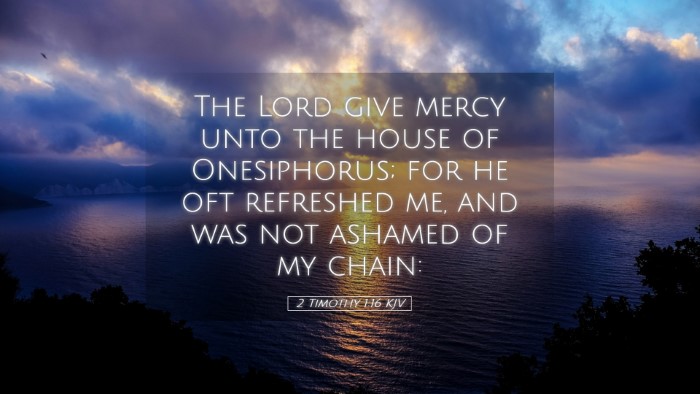Old Testament
Genesis Exodus Leviticus Numbers Deuteronomy Joshua Judges Ruth 1 Samuel 2 Samuel 1 Kings 2 Kings 1 Chronicles 2 Chronicles Ezra Nehemiah Esther Job Psalms Proverbs Ecclesiastes Song of Solomon Isaiah Jeremiah Lamentations Ezekiel Daniel Hosea Joel Amos Obadiah Jonah Micah Nahum Habakkuk Zephaniah Haggai Zechariah Malachi2 Timothy 1:16
2 Timothy 1:16 KJV
The Lord give mercy unto the house of Onesiphorus; for he oft refreshed me, and was not ashamed of my chain:
2 Timothy 1:16 Bible Commentary
Commentary on 2 Timothy 1:16
Verse: “The Lord grant mercy to the household of Onesiphorus, for he often refreshed me and was not ashamed of my chain.”
Introduction
This verse reflects Paul’s personal and heartfelt appreciation for Onesiphorus, a companion in the faith who remains a vital testimony of loyalty and support amidst trials. The Apostle Paul, during his imprisonment, likely felt isolated and abandoned by many. Yet, amidst these adversities, Onesiphorus stands as a figure of encouragement and faithfulness.
Insights from Matthew Henry
Matthew Henry emphasizes the theme of mercy and the importance of showing kindness to those who labor in the faith. He points out that Paul specifically asks for mercy to be granted to the household of Onesiphorus, suggesting that the acts of kindness shown by this family were invaluable during a time of considerable suffering for Paul. Henry notes:
- Mercy as a Divine Gift: The request for mercy highlights the benevolent nature of God and underscores the belief that the household deserves divine blessing for their support.
- The Role of Community: Onesiphorus is portrayed not just as an individual but as a representative of a supportive family unit that embodies Christian charity at its best.
Henry reflects on the statement that Onesiphorus “refreshed” Paul, interpreting it as a metaphor for spiritual rejuvenation and communal solidarity. He urges modern believers to think about how they can provide similar comfort to others in distress.
Insights from Albert Barnes
Albert Barnes focuses on the implications of not being “ashamed of my chain.” This phrase captures the essence of true discipleship and the necessity for believers to stand firm in their convictions and support one another:
- Bravery in the Face of Persecution: Barnes asserts that Onesiphorus’ willingness to associate with Paul, especially during his imprisonment, reflects a remarkable bravery that was not common among those in the early Church.
- The Importance of Refreshment: Barnes explains that "refreshing" implies various forms of encouragement—spiritually, emotionally, and perhaps materially. Such actions not only uplift the person in need but also strengthen the entire community of faith.
Furthermore, Barnes emphasizes the theological significance of mercy. He notes that mercy stems from God’s nature and should be a guiding principle in the lives of believers, calling them to embody the same compassion shown by Christ.
Insights from Adam Clarke
Adam Clarke takes a more practical approach, discussing the socio-cultural ramifications of Paul’s words. He asserts that the society of that time often ostracized those associated with imprisonment, highlighting the noble character of Onesiphorus. Clarke shares the following insights:
- Social Stigma: Associating with a prisoner could lead to social backlash, yet Onesiphorus’s actions defy such norms, illustrating a radical commitment to Christ and his representative.
- The Significance of Family: Clarke elaborates on the household of Onesiphorus being a pivotal support system. This reflects the biblical principle that the family unit can and should be a source of strength and encouragement in faith.
Clarke also highlights that the term "refresh" indicates more than physical relief; it indicates emotional and spiritual upliftment, which are crucial in times of spiritual warfare.
Theological Reflections
The verse raises significant theological implications regarding mercy, support in the body of Christ, and the manifestation of faith in times of trial. The request for mercy points to the nature of God, affirming that He is merciful and expects His followers to extend that mercy to others.
- Community Support: The early Church's support for one another serves as a model for contemporary believers, demonstrating that community is a vital component of Christian faith and resilience.
- Identity in Christ: Onesiphorus’s actions position him as a role model for believers today who are encouraged to identify with others even when it might come with personal cost.
Concluding Thoughts
In conclusion, 2 Timothy 1:16 is not merely a small personal note from Paul but a profound statement on mercy, community, and Christian fellowship. It is a call for believers to reflect on whom they can refresh with their support and how they can be unashamed in their association with those who represent Christ’s suffering. As pastors, students, theologians, and scholars reflect on this text, it can serve as a powerful reminder of the importance of standing together and demonstrating mercy in our own households and communities.


